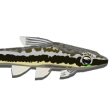Common BN color changes
Common BN color changes
Hello,
No picture yet because I'm pretty sure that what I have is a common aquarium trade BN.
My question is, is it normal for the common BN to change it's coloration to match (sort of) what it's resting on?
I bought one for algae clean up in my 55 gal tank. I liked it so much that I got 2 more a few weeks later, another for the 55gal and one for my 30 gal.
The first one turned out to be female and the others male. I got them at the same LFS and believe them to be all from the same shipment of common BN. Both males are very typical BNs and look like all the photos I've seen. The males don't seem to change color, but then they tend to lurk in their chosen caves and not cruise around the tank. The female looks like the males when on the black substrate, but when she is resting on a light colored artificial rock her base color turns blotchy and she gets distinct stripes of light color on her face. The blotches remind me a bit of the "stress coloration" but the stress coloration looks washed out yet she is vibrant and quite striking in this color mode, plus she only looks this way when she's on something light colored. What's the verdict, is she a normal common BN or some throwback to something odd in her ancestry?
No picture yet because I'm pretty sure that what I have is a common aquarium trade BN.
My question is, is it normal for the common BN to change it's coloration to match (sort of) what it's resting on?
I bought one for algae clean up in my 55 gal tank. I liked it so much that I got 2 more a few weeks later, another for the 55gal and one for my 30 gal.
The first one turned out to be female and the others male. I got them at the same LFS and believe them to be all from the same shipment of common BN. Both males are very typical BNs and look like all the photos I've seen. The males don't seem to change color, but then they tend to lurk in their chosen caves and not cruise around the tank. The female looks like the males when on the black substrate, but when she is resting on a light colored artificial rock her base color turns blotchy and she gets distinct stripes of light color on her face. The blotches remind me a bit of the "stress coloration" but the stress coloration looks washed out yet she is vibrant and quite striking in this color mode, plus she only looks this way when she's on something light colored. What's the verdict, is she a normal common BN or some throwback to something odd in her ancestry?
-
Mike_Noren
- Posts: 1395
- Joined: 25 Jul 2003, 21:40
- I've donated: $30.00!
- My articles: 1
- My images: 37
- My cats species list: 5 (i:0, k:0)
- Spotted: 9
- Location 1: Sweden
- Location 2: Sweden
Re: Common BN color changes
Fishes tend to have two types of color changes. There's fast (seconds) changes depending on mood, and slow (days) adjustments of the entire color scale depending on surroundings, reproductive status, and nutrition. From what I've seen of my Commons they seem to behave that same way: they have a number of fast mood-based colorations, the general tone of which changes slowly, over days, to fit the surroundings.Amberdawn wrote:My question is, is it normal for the common BN to change it's coloration to match (sort of) what it's resting on?
- Carp37
- Posts: 596
- Joined: 21 Sep 2007, 13:08
- My cats species list: 16 (i:7, k:0)
- My aquaria list: 7 (i:6)
- My BLogs: 2 (i:0, p:51)
- Location 2: Aughton UK
- Interests: fish, fishing, fossils, evolution/taxonomy, films
Re: Common BN color changes
I've also got common bristlenose, of which some individuals seem to change their colouration to be a lot paler (more yellowish brown, with orangish saddles, than greenish black) in the medium to long-term (i.e. for at least several months). I've had it with young dominant males and subdominant fish, so it doesn't appear to be a stress phenomenon (it also seems to be different patterning to normal stress colouration), and I've also had them change back to dark colouration again as they fully mature. I've no idea what causes it as it only affects a few individuals, and they all start off black, and get fed the same stuff.
Megalechis thoracata, Callichthys callichthys, Brochis splendens (and progeny), Corydoras sterbai, C. weitzmani, CW044 cf. pestai, CW021 cf. axelrodi, Pterygoplichthys gibbiceps, Ancistrus cf. cirrhosus (and progeny), Panaque maccus, Panaque nigrolineatus, Synodontis eupterus
- MatsP
- Posts: 21038
- Joined: 06 Oct 2004, 13:58
- My articles: 4
- My images: 28
- My cats species list: 117 (i:33, k:0)
- My aquaria list: 10 (i:8)
- My BLogs: 4 (i:0, p:164)
- Spotted: 187
- Location 1: North of Cambridge
- Location 2: England.
Re: Common BN color changes
Moved, as it's less about ID and more about the behaviour/normality of the fish.
--
Mats
--
Mats




